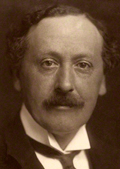 |
Herbert John Gladstone
b. 18 Feb 1854, London, England, U.K.
d. 6 Mar 1930, Ware, Hertfordshire, U.K. |
| Title: |
Governor-General and Commander-in-Chief in and over the Union of South Africa =
Goeverneur-generaal en Opperbevelhebber in en over de Unie van Zuid-Afrika |
| Term: |
31 May 1910 - 8 Sep 1914 |
| Chronology: |
30 Mar 1910,
appointed by Commission under the Royal Sign Manual and Signet [1] |
| |
31 May 1910, took an oath of allegiance and an oath of office as Governor-General and Commander-in-Chief of the Union of South Africa, public ceremony, Legislative Assembly chamber, Government Buildings, Pretoria [1] |
| |
8 Sep 1914,
appointment superseded by the Commission of a successor effective on taking the prescribed oaths (8 Sep 1914) [2][3] |
| Names/titles: |
Nobility title (conferred): Viscount Gladstone of the county of Lanark (from 15 Feb 1910) [4] |
| Biography: |
| Youngest of the four sons of William Ewart Gladstone; was educated at Eton; enrolled at University College, Oxford, where he obtained a third class in classics (1874) and a first class in modern history (1876); was a history lecturer at Keble College (1877-1880); unsuccessfully contested the Conservative county constituency of Middlesex at the General Election of 1880; was returned Liberal Member of Parliament for Leeds (1880-1885), a seat vacated by his father, who had won both Leeds and Midlothian, but had opted for the latter; after the reorganisation of the constituencies, he was again returned to Parliament as representative of West Leeds (1885-1910); acted as one of his father's private secretaries until 1881, when he was appointed a Liberal whip and one of the Lords Commissioners of the Treasury (24 Aug 1881- 29 Jun 1885); after his visit to Ireland (1882), he became sympathetic to the cause of Irish Home Rule; in his father's Liberal government he was first appointed financial secretary at the War Office (1886), and then, Under-Secretary of State for the Home Office (1892-1894), under Herbert Henry Asquith; sworn in as a member of the UK Privy Council (10 Mar 1894); served as First Commissioner of Works (1894-1895) in the Liberal Cabinet of Lord Rosebery; during a decade when the Liberal Party was in opposition, he served as Liberal chief whip (1899-1905), playing a major part in keeping the Liberals together over the issue of the Boer war; was appointed Secretary of State for the Home Department (11 Dec 1905 - 19 Feb 1910) in the government of Sir Henry Campbell-Bannerman; gave up his seat in the House of Commons and was raised to the peerage as Viscount Gladstone (15 Feb 1910); appointed the first holder of the office of Governor-General of the Union of South Africa (31 May 1910 - 8 Sep 1914); succeeded William Waldegrave Palmer, Earl of Selborne as High Commissioner for South Africa (31 May 1910 - 8 Sep 1914); landed in Cape Town 17 May 1910 and proceeded to Pretoria where he took office 31 May 1910; called upon Louis Botha to form a constitutional government for the Union; faced difficulties when Botha resigned in 1912, but he encouraged Botha to form a new government; was forced to introduce martial law in the Johannesburg area because of various industrial disputes (1913); after returning to Britain, he became treasurer of the War Refugees Committee and devoted himself to dealing with Belgian refugees in Great Britain; worked at Liberal party headquarters (1922-1923) to reorganize the declining party; was also involved in work for the League of Nations. |
| Biographical sources: "Herbert Gladstone: A Memoir", by Sir Charles E. Mallet (London: Hutchinson, 1932); The Times, No. 45,454, Royal Edition, London, Thursday, March 6, 1930, p. 14 (obituary). |
| |
| [1] |
Government Gazette, No. 1, Extra, 31 May 1910, p. (1); Rand Daily Mail, No. 2,318, 1 Jun 1910, p. 7. |
| [2] |
Government Gazette, No. 571, Extra, 8 Sep 1914, pp (i)-ii. |
| [3] |
After Viscount Gladstone permanently left South Africa, his functions were taken over by John Henry De Villiers, Baron De Villiers of Wynberg as Officer Administering the Government of the Union of South Africa :: Ambtenaar belast met de Regering van de Unie van Zuid-Afrika (11 Jul 1914 - 2 Sep 1914), who died in office and was succeeded by Sir James Rose-Innes (2 Sep 1914 - 8 Sep 1914), continuing in office until the installation of Viscount Buxton. |
| [4] |
London Gazette, No. 28350, 22 Mar 1910, p. 2029. |
| |
Image: photograph (1903). |

